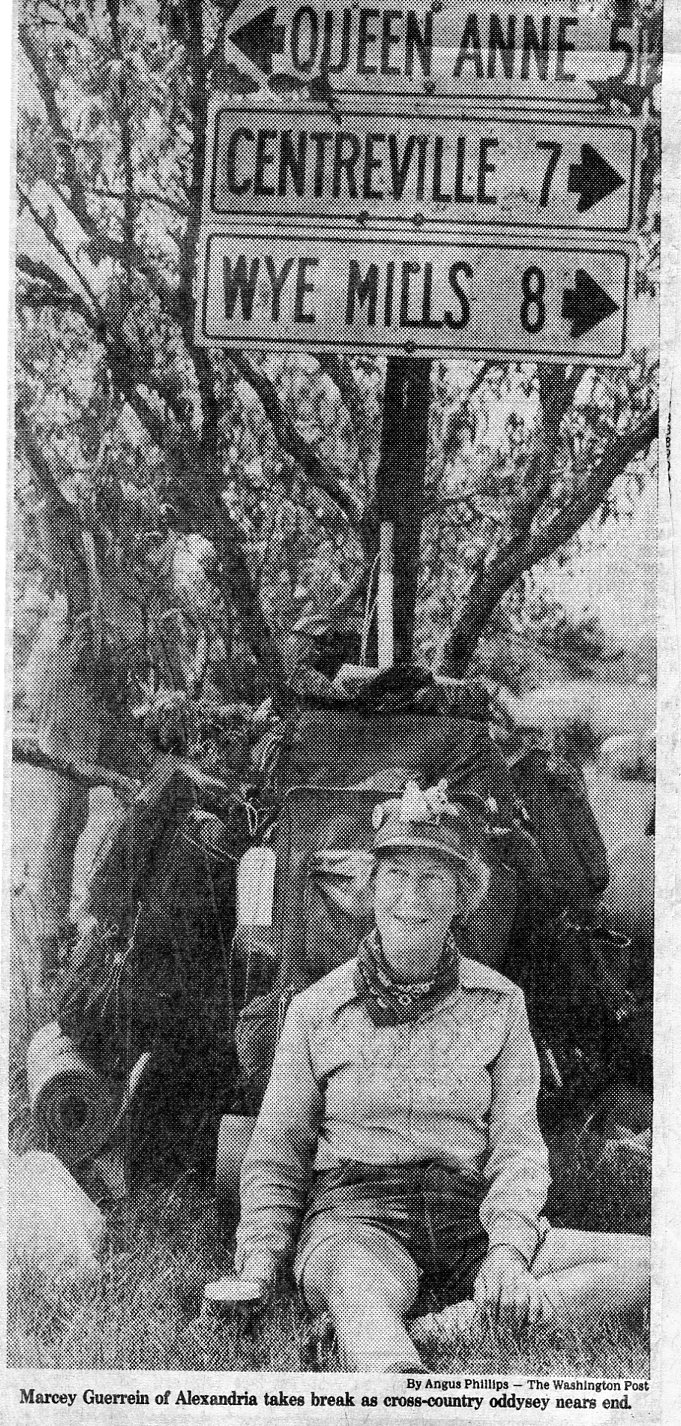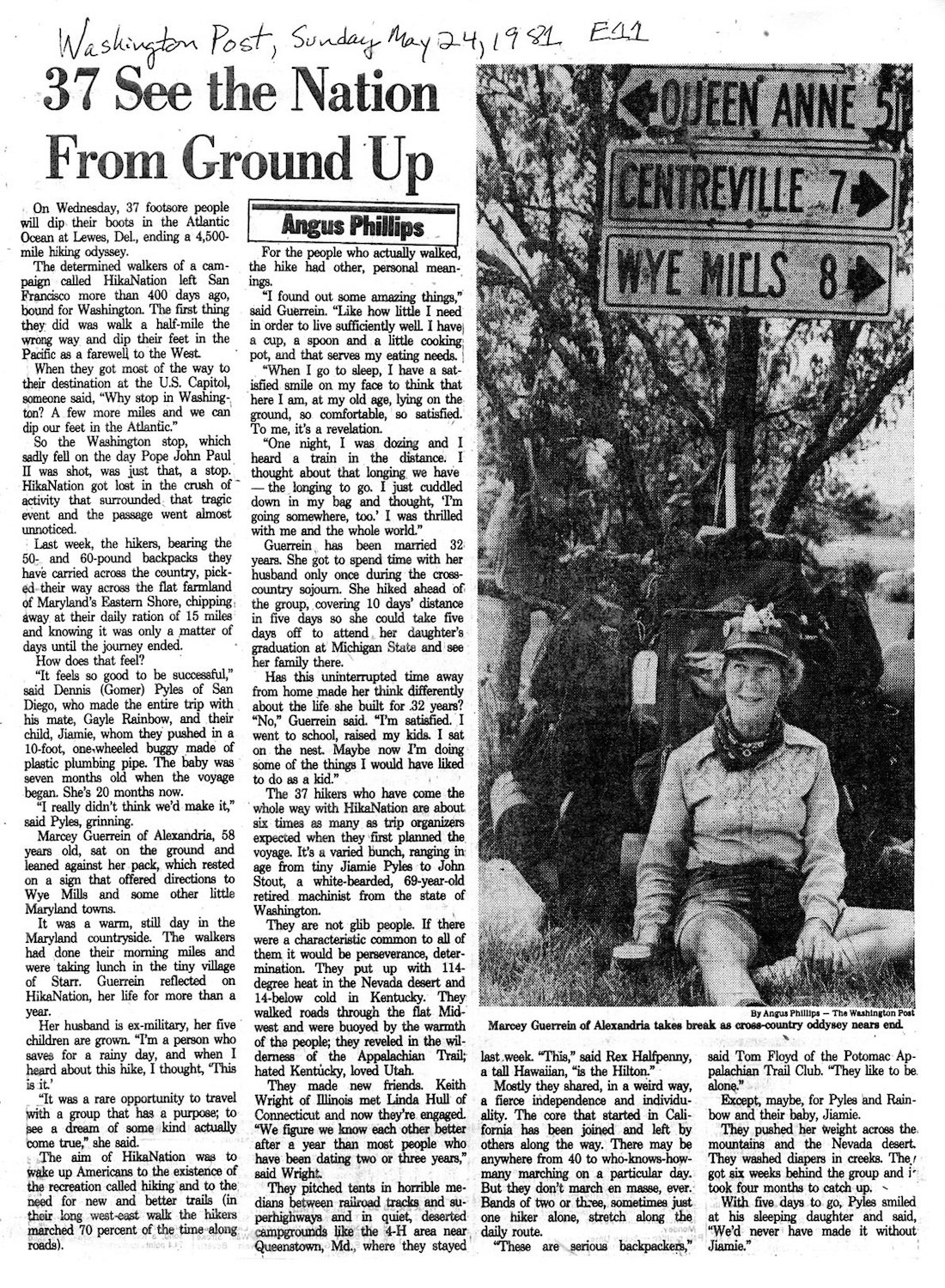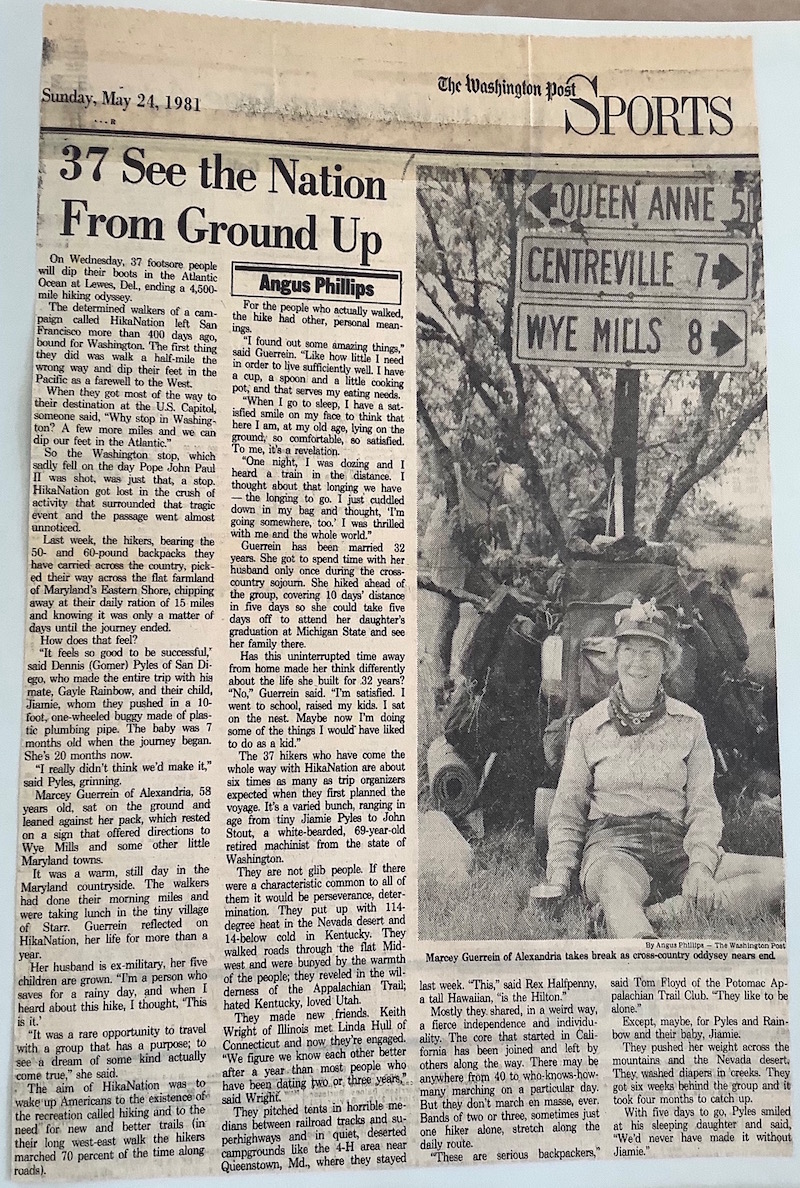37 See the Nation From Ground UpClick images for larger versions. |
37 See the Nation From Ground UpBy Angus Phillips May 24, 1981On Wednesday, 37 footsore people will dip their boots in the Atlantic Ocean at Lewes, Del., ending a 4,500-mile hiking odyssey. The determined walkers of a campaign called HikaNation left San Francisco more than 400 days ago, bound for Washington. The first thing they did was walk a half-mile the wrong way and dip their feet in the Pacific as a farewell to the West. When they got most of the way to their destination at the U.S. Capitol, someone said, "Why stop in Washington? A few more miles and we can dip our feet in the Atlantic." So the Washington stop, which sadly fell on the day Pope John Paul II was shot, was just that, a stop. HikaNation got lost in the crush of activity that surrounded that tragic event and the passage went almost unnoticed. Last week, the hikers, bearing the 50- and 60-pound backpacks they have carried across the country, picked their way across the flat farmland of Maryland's Eastern Shore, chipping away at their daily ration of 15 miles and knowing it was only a matter of days until the journey ended. How does that feel? "It feels so good to be successful, said Dennis (Gomer) Pyles of San Diego, who made the entire trip with his mate Gayle Rainbow, and their child, Jiamie, whom they pushed in a 10-foot, one-wheeled buggy made of plastic plumbing pipe. The baby was 7 months old when the journey began. She's 20 months now. "I really didn't think we'd make it," said Pyles, grinning. Marcey Guerrein of Alexandria, 58 years old, sat on the ground and leaned against her pack, which rested on a sign that offered directions to Wye Mills and some other little Maryland towns. It was a warm, still day in the Maryland countryside. The walkers had done their morning miles and were taking lunch in the tiny village of Starr. Guerrein reflected on HikaNation, her life for more than a year. o Her husband is ex-military, her five children are grown. "I'm a person who saves for a rainy day, and when I heard about this hike, I thought, 'This is it.' "It was a rare opportunity to travel with a group that has a purpose; to see a dream of some kind actually come true," she said. The aim of HikaNation was to wake up Americans to the existence of the recreation called hiking and to the need for new and better trails (in their long west-east walk the hikers marched 70 percent of the time along roads). For the people who actually walked, the hike had other, personal meanings. "I found out some amazing things," said Guerrein. "Like how little I need in order to live sufficiently well. I have a cup, a spoon and a little cooking pot, and that serves my eating needs. "When I go to sleep, I have a satisfied smile on my face to think that here I am, at my old age, lying on the ground, so comfortable, so satisfied. To me, it's a revelation. "One night, I was dozing and I heard a train in the distance. I thought about that longing we have -- the longing to go. I just cuddled down in my bag and thought, 'I'm going somewhere, too.' I was thrilled with me and the whole world." Guerrein has been married 32 years. She got to spend time with her husband only once during the cross-country sojourn. She hiked ahead of the group, covering 10 days' distance in five days so she could take five days off to attend her daughter's graduation at Michigan State and see her family there. Has this uninterrupted time away from home made her think differently about the life she built for 32 years? "No," Guerrein said. "I'm satisfied. I went to school, raised my kids. I sat on the nest. Maybe now I'm doing some of the things I would have liked to do as a kid." The 37 hikers who have come the whole way with HikaNation are about six times as many as trip organizers expected when they first planned the voyage. It's a varied bunch, ranging in age from tiny Jiamie Pyles to John Stout, a white-bearded, 69-year-old retired machinist from the state of Washington. They are not glib people. If there were a characteristic common to all of them it would be perserverance, determination. They put up with 114-degree heat in the Nevada desert and 14-below cold in Kentucky. They walked roads through the flat Midwest and were buoyed by the warmth of the people; they reveled in the wilderness of the Appalachian Trail; hated Kentucky, loved Utah. They made new friends. Keith Wright of Illinois met Linda Hull of Connecticut and now they're engaged. "We figure we know each other better after a year than most people who have been dating two or three years," said Wright. They pitched tents in horrible medians between railroad tracks and superhighways and in quiet, deserted campgrounds like the 4-H area near Queenstown, Md., where they stayed last week. "This," said Rex Halfpenny, a tall Hawaiian, "is the Hilton." Mostly they shared, in a weird way, a fierce independence and individuality. The core that started in California has been joined and left by others along the way. There may be anywhere from 40 to who-knows-how-many marching on a particular day. But they don't march en masse, ever. Bands of two or three, sometimes just one hiker alone, stretch along the daily route. "These are serious backpackers," said Tom Floyd of the Potomac Appalachian Trail Club. "They like to be alone." Except, maybe, for Pyles and Rainbow and their baby, Jiamie. They pushed her weight across the mountains and the Nevada desert. They washed diapers in creeks. They got six weeks behind the group and it took four months to catch up. With five days to go, Pyles smiled at his sleeping daughter and said, "We'd never have made it without Jiamie." The Washington Post: |


